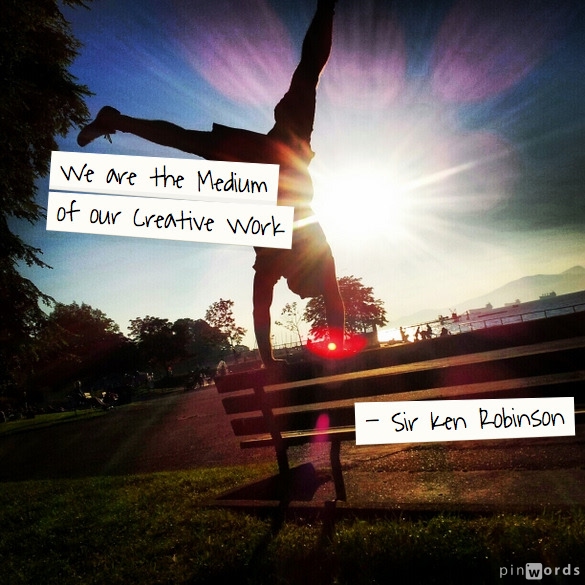There is a lot of talk about practice time, discipline, focus and attention to details in the world of juggling and Flow Arts. The combined action of this work is what I call Fitness Praxis. Yet, there are so many areas which we can put our attention to, which ones are the most important? Of course, it depends on what the outcome of your work will be, but there are a few areas which are important to us all as humans.
As physical practitioners, we should be training more than just our props. If we do not, we will not reach our full potential because we lack strength, agility and endurance. It is inevitable that we will get injured if we do not include sports training in our art work. In other sports disciplines it’s called cross-training, which means the body is more balanced, you protect yourself from repetitive strain injuries (RSI) and the result is more energy and dynamic mobility.
“It is inevitable that we will get injured
if we do not include sports training in our
art work.”
Currently, my full time job is a training circuit. I realize this is a small luxury, it’s also circumstantial due to immigration to a new country. I consider my ‘free time’ here as ‘time to seriously school myself’. Honestly, I wish there was time for this level of commitment when I started 10 years ago. Instead, I worked on my prop training, community building and university education. Those were also good things to do, but my body suffered injuries that were preventable. Through the years I discovered a more balanced and full-on approach to my work.
My current personal physical training curriculum includes:
- Running: 1 hour 3 X weekly (approx 25 kms) (3 hours)
- Biking: commuting 20 minutes 5 X weekly (1.4 hours)
- Stretching/Flexibility: 1 hour 3 X weekly (3 hours)
- Prop Training: 21+ hours of prop training weekly (21 hours)
- Shows/Busking: (Off Season) 4 hours of busking or shows weekly (4 hours)
- Circuit Training: 2 hours of circuit training weekly (2 hours)
- Posture/ Balance: Alexander Technique 40 minutes 5 X weekly (3.30 hours)
- Clown: 2 hours weekly (2 hours)
- Dance Class: 3 hours dance class bi-weekly (1.5 hours)
Total training hours: 41.2 hours weekly.
The same as if I was working a 9-5 work week, except it’s all circus all the time. (YAY!) This doesn’t include other work I do for business, videos, writing or promotion. It will also change as I get into summer season and drastically increasing my busking / shows I am doing (likely decreasing prop practice time).
The reason I put so much time into these various disciplines is to be balanced on all physical fitness levels. There are 5 basic fitness principles that should be standards to your circus practice. These are 5 things you should be including as your cross discipline, on top of training your prop, and your show routines.
Cardio
Running, biking, swimming, jumping jacks, soccer practice – it doesn’t matter how you accomplish aerobic activity, but the general health guidance for the average person is at least 20 minutes of vigorous activity 3 times per week. But, that is just for regular people at regular jobs. If you are a circus artist, I would consider at least doubling that. You want to ensure you put cardio into your discipline to increase the strength of your heart and lungs, warm up the body and move in different ways than your repeated practice. This will also reduce stress and is well known to give temporary relief from anxiety or depression. Cardio is the hygiene of our physical body, especially if you increased water intake and increase your breathe intake with your exertion. For the vanity in us, it also increases appearance by pushing blood and oxygen through all your vessels making your skin glow, which helps boost confidence, and yes, can help weight loss if that is your goal.
Endurance
I consider endurance the cross between cardio and strength training. Circuit training is one of the best ways to get good at endurance. Building endurance helps you practice your other disciplines longer. It helps your body gain energy which pushing it little by little to endure physical stress. Increasing your ability to continue a summers worth of shows over the long haul of a hard day, week or month will make you more professional as a circus performer. It helps you build focus and determination over long stretches of time and helps you learn your bodies limits. This can give you good indication on when to push yourself, or when to rest before you reach burnout.
Strength
Doing some strength exercises once a week gives helps your endurance, helps your posture and makes you look good for the opposite sex. I love this article on why you should plank every day. It explains why your balance improves with core strengthening, how your risk of injury drops and you can do it anywhere! Doing push ups and weights is also helpful, as getting stronger in the arms means they have more control over the props you are using, and your props will seem light in comparison to your own body weight! It might even help you with those acrobatics you need to really jazz up your act.
Flexibility
Stretching before and after each time you pick up a prop will give you a longer lifetime in the circus. Dynamic stretching to help you warm up helps circulation and preparation for the muscles before they begin an activity. Static Stretching at the end of practice helps you relax and elongate your muscles. This can decrease tension in the muscles after prolonged use. It can help decrease possibilities of RSI and carpal tunnel syndrome. Flexibility is one of the basic tenants of fitness, and working on it consistently is important for your whole body. Yoga is a good practice for both flexibility and balance. It also improves posture and circulation. It also feels really good! But be careful, It can be very easy to hurt yourself with flexibility, so please ensure you know the proper form before attempting certain stretching techniques.
Balance
Core strength and mindfulness of the body is at the basis of balance practice. Practices like Yoga, Tai Chi and Alexander Technique are very good for learning more about balance. Everyone should be practicing balance, but circus practitioners especially. Balance will help with transitions between postures in between tricks, getting up from the floor and recalibrations if jumping or running and coming to a dead stop. It is noticeable when someone is off balance, and the better the balance, the more professional you look. On top of all else, it will decrease your chances of falling, which as you get older, can change the quality of life dramatically.
These are the basics of physical fitness that we all need to be aware of when using our bodies. Any other skill training is on top of these basic ideas of cardio, endurance, strength, flexibility and balance.
Happy Training!



Comments 1
You are amazing! I agree that you should include training in your life to improve your career. Otherwise, you will be injured. I admire your focus and love for what you do. Keep it going!